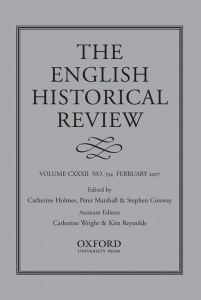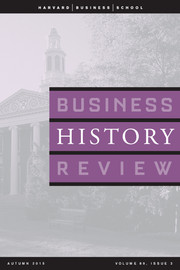Giacomo Macola (ed), The Colonial Occupation of Katanga: The Personal Correspondence of Clement Brasseur, 1893-1897 (Oxford: Fontes Historiae Africanae, 2018)
The Colonial Occupation of Katanga consists of a translated and richly annotated edition of the personal correspondence of Lieutenant (later Captain) Clément Brasseur, the military officer in charge of Lofoi, the first post of the Congo Free State in Katanga. The letters date from September 1893, the month of his arrival in the region, and continue up to 9 November 1897, the day before his career of conquest and subjugation came to a violent end outside the trader Kiwala’s fortified camp on the Luapula River. All of the seventeen long letters included in the volume are addressed to Brasseur’s elder brother, Désiré, a fellow military officer; most of them take the form of regularly updated journals and travelogues.
Brasseur’s dense personal correspondence describes in exceptional detail both his day-to-day activities and administrative determinations and the numerous military operations that he and/or his local allies undertook with a view to impressing upon Katangese communities the need to comply with instructions relating to taxation in kind and labour. The striking candidness and directness of the records presented in this edition challenge top-down understandings of the violent workings of the Congo Free State, cast unprecedented light on early colonial state-building in Katanga and show that the latter process was deeply informed by African strategies and interests. These themes are systematically pursued in the volume’s extensive introduction, which advances the idea that the Congo Free State is best understood as a continuation of the nineteenth-century warlord order in Central Africa, rather than the embodiment of a ‘modern’ colonial project.
Temilola Alanamu, Benedict Carton and Benjamin N. Lawrance, ‘Colonialism and African Childhood’ in Martin Shanguhyia and Toyin Falola (eds), The Palgrave Handbook of African Colonial and Postcolonial History (London: Palgrave, 2018), pp. 389-412.
This wide-ranging volume presents the most complete appraisal of modern African history to date. It assembles dozens of new and established scholars to tackle the questions and subjects  that define the field, ranging from the economy, the two world wars, nationalism, decolonization, and postcolonial politics to religion, development, sexuality, and the African youth experience. Contributors are drawn from numerous fields in African studies, including art, music, literature, education, and anthropology. The themes they cover illustrate the depth of modern African history and the diversity and originality of lenses available for examining it. Older themes in the field have been treated to an engaging re-assessment, while new and emerging themes are situated as the book’s core strength. The result is a comprehensive, vital picture of where the field of modern African history stands today.
that define the field, ranging from the economy, the two world wars, nationalism, decolonization, and postcolonial politics to religion, development, sexuality, and the African youth experience. Contributors are drawn from numerous fields in African studies, including art, music, literature, education, and anthropology. The themes they cover illustrate the depth of modern African history and the diversity and originality of lenses available for examining it. Older themes in the field have been treated to an engaging re-assessment, while new and emerging themes are situated as the book’s core strength. The result is a comprehensive, vital picture of where the field of modern African history stands today.
Temilola Alanamu, ‘Church Missionary Society evangelists and women’s labour in nineteenth-century Abẹ́òkúta, Africa, 88:2 (2018), pp. 291-311.
This article is about women’s labour in nineteenth-century Abẹ́òkúta, in present-day south-west  Nigeria. It is based on primary research which explores women’s economic independence and its intricate connection to the indigenous institution of polygyny. By examining the institution from the perspective of Anglican Church Missionary Society evangelists, it also demonstrates how indigenous culture conflicted with the newly introduced Christian religion and its corresponding Victorian bourgeois ideals of the male breadwinner and the female homemaker. It investigates the extent to which missionaries understood women’s work in the Yorùbá context, their representations of the practice, their attempts to halt female labour and their often unsuccessful efforts to extricate their congregations and their own families from these local practices. It argues that European Christian principles not only coloured missionary perceptions of women’s labour, but influenced their opinions of the entire Yorùbá matrimonial arrangement.
Nigeria. It is based on primary research which explores women’s economic independence and its intricate connection to the indigenous institution of polygyny. By examining the institution from the perspective of Anglican Church Missionary Society evangelists, it also demonstrates how indigenous culture conflicted with the newly introduced Christian religion and its corresponding Victorian bourgeois ideals of the male breadwinner and the female homemaker. It investigates the extent to which missionaries understood women’s work in the Yorùbá context, their representations of the practice, their attempts to halt female labour and their often unsuccessful efforts to extricate their congregations and their own families from these local practices. It argues that European Christian principles not only coloured missionary perceptions of women’s labour, but influenced their opinions of the entire Yorùbá matrimonial arrangement.
Andrew Cohen and Rory Pilossof, ‘Big Business and White Insecurities at the End of Empire in Southern Africa, c.1961-1977′, Journal of Imperial and Commonwealth History 45:5 (2017), pp. 777-799.
This paper examines popular and widespread mistrust of large-scale capitalism, and its potentia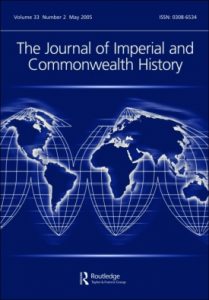 l for disloyalty to the post-1965 Rhodesian state, by the white middle class and small-scale capitalists in Rhodesia. It focuses on the relationship between Roland ‘Tiny’ Rowland, managing-director of the multinational Lonrho company, and Wilfred Brooks, the editor of the largest business/trade journal in Rhodesia, Rhodesian Property & Finance. This case is augmented with observations on the role and actions of other multinationals such as the Anglo American Corporation and the newspaper conglomerate of the Argus Press, which illustrate how white, urban, small-scale capital responded to the political changes underway. A close reading of Property & Finance in the early 1960s suggests there was a general fear of large-scale business enterprise without firm Rhodesian roots. As the 1960s progressed, this fear morphed into concerns of big businesses’ relationship with African nationalists and the pan-African movement. Many saw these companies as too friendly with new African political entities. In particular, Rowland’s willingness to work with independent Africa, and particularly the Organisation of African Unity, was of crucial importance in shaping the way in which Property & Finance engaged with Lonrho’s business activities. These findings illustrate key divisions within the white community during a time of radical change. Furthermore, they cast light on the contested, and often contradictory, role played by these multinational companies during the era of decolonisation and political change in southern Africa.
l for disloyalty to the post-1965 Rhodesian state, by the white middle class and small-scale capitalists in Rhodesia. It focuses on the relationship between Roland ‘Tiny’ Rowland, managing-director of the multinational Lonrho company, and Wilfred Brooks, the editor of the largest business/trade journal in Rhodesia, Rhodesian Property & Finance. This case is augmented with observations on the role and actions of other multinationals such as the Anglo American Corporation and the newspaper conglomerate of the Argus Press, which illustrate how white, urban, small-scale capital responded to the political changes underway. A close reading of Property & Finance in the early 1960s suggests there was a general fear of large-scale business enterprise without firm Rhodesian roots. As the 1960s progressed, this fear morphed into concerns of big businesses’ relationship with African nationalists and the pan-African movement. Many saw these companies as too friendly with new African political entities. In particular, Rowland’s willingness to work with independent Africa, and particularly the Organisation of African Unity, was of crucial importance in shaping the way in which Property & Finance engaged with Lonrho’s business activities. These findings illustrate key divisions within the white community during a time of radical change. Furthermore, they cast light on the contested, and often contradictory, role played by these multinational companies during the era of decolonisation and political change in southern Africa.
Ambrogio A. Caiani, Ornamentalism in a European Context? Napoleon’s Italian Coronation, 26 May 1805, English Historical Review, 132:544 (2017), pp. 41-72.
Napoleon’s Italian Coronation has been neglected, or at best consigned to a footnote, in historical scholarship. The ceremony involved immense expenditure and thousands of participants, but its true importance lay in the elusive—and somewhat confused—semiotic claims put forward by its organisers. The manner in which the events of May 1805 were choreographed reveals much about how French imperialists viewed their nascent Empire and their relationship with their northern Italian citizen-subjects. The argument put forward here is inspired by the concept of ‘ornamentalism’. While the realities of imperial brutality, cultural chauvinism and economic exploitation of conquered territories cannot be brushed under the carpet, the reverse side of this coin is also worthy of further investigation. Nowhere more than in the satellite kingdom of Italy did Napoleon seek to promote collaboration and local investment in his supranational empire. He rewarded, honoured and rallied his Lombard and Emilian officials in order to endow them with a sense that they belonged to, and benefited from membership of, the wider imperial community. The coronation in Milan, on 26 May 1805, was an important experiment in the creation of new hierarchies and elite affinities. Its mixed, though significant, legacy was continued, to a certain extent, by Napoleon’s Habsburg successors well into the first half of the nineteenth century.
Andrew Cohen, The Politics and Economics of Decolonization in Africa: The Failed Experiment of the Central African Federation (London: I. B. Tauris, 2017).
The slow collapse of the European colonial empires after 1945 provides one of the great turning 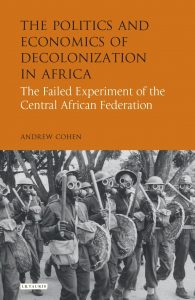 points of twentieth century history. With the loss of India however, the British under Harold Macmillan attempted to enforce a ‘second’ colonial occupation – supporting the efforts of Sir Andrew Cohen of the Colonial Office to create a Central African Federation. Drawing on newly released archival material, The Politics and Economics of Decolonization offers a fresh examination of Britain’s central African territories in the late colonial period and provides a detailed assessment of how events in Britain, Africa and the UN shaped the process of decolonization. The author situates the Central African Federation – which consisted of modern day Zambia, Zimbabwe and Malawi – in its wider international context, shedding light on the Federation’s complex relationships with South Africa, with US Presidents Dwight Eisenhower and John F. Kennedy and with the expanding United Nations. The result is an important history of the last days of the British Empire and the beginnings of a more independent African continent.
points of twentieth century history. With the loss of India however, the British under Harold Macmillan attempted to enforce a ‘second’ colonial occupation – supporting the efforts of Sir Andrew Cohen of the Colonial Office to create a Central African Federation. Drawing on newly released archival material, The Politics and Economics of Decolonization offers a fresh examination of Britain’s central African territories in the late colonial period and provides a detailed assessment of how events in Britain, Africa and the UN shaped the process of decolonization. The author situates the Central African Federation – which consisted of modern day Zambia, Zimbabwe and Malawi – in its wider international context, shedding light on the Federation’s complex relationships with South Africa, with US Presidents Dwight Eisenhower and John F. Kennedy and with the expanding United Nations. The result is an important history of the last days of the British Empire and the beginnings of a more independent African continent.
——————————————————————————————————————————-Temilola Alanamu, Transnational Connections and the Making of Modern Childhood in the Nineteenth and Early Twentieth Centuries: A Review Article, Journal of Colonialism and Colonial History, 17:3 (2016). 
A review article discussing the following books:
Rory Pilossof, ‘Possibilities and Constraints of Market-Led Land Reforms in Southern Africa: An Analysis of Transfers of Commercial Farmland in Postcolonial ZImbabwe, 1980-2000’, Journal of Agrarian Change, vol. 16, no. 1 (2016), pp. 32-49.
This paper provides a systematic basis, hitherto missing in the current scholarship, to quantify land transfers in Zimbabwe after 1980. It uses title deed information to determine year of sale via a number of sources. The main finding of this research is that a great deal of land changed ownership during this period, which, if the government had been committed to land reform, it could have acted upon. Evidence suggests as much as 67 per cent of white-owned land changed ownership after 1980. The second is that, while a large amount of land did change hands, it was not the 80 per cent that many white farmers and their supporters have claimed. The figure of 69 per cent is still very high, but it is apparent that much of this did not represent ‘true’ transfer of land. By further investigating the land that did change hands, this paper also raises questions about (a) the possibilities of market-led land reform in Zimbabwe and Southern Africa, and (b) the relationship between white capital and the new political elite in the postcolonial state.
land transfers in Zimbabwe after 1980. It uses title deed information to determine year of sale via a number of sources. The main finding of this research is that a great deal of land changed ownership during this period, which, if the government had been committed to land reform, it could have acted upon. Evidence suggests as much as 67 per cent of white-owned land changed ownership after 1980. The second is that, while a large amount of land did change hands, it was not the 80 per cent that many white farmers and their supporters have claimed. The figure of 69 per cent is still very high, but it is apparent that much of this did not represent ‘true’ transfer of land. By further investigating the land that did change hands, this paper also raises questions about (a) the possibilities of market-led land reform in Zimbabwe and Southern Africa, and (b) the relationship between white capital and the new political elite in the postcolonial state.
_________________________________________________________________________________
Alessandro Pes, ‘An empire for a kingdom: monarchy and Fascism in the Italian colonies’, in R. Aldrich and C. McCreery (Eds.), Crowns and Colonies. European monarchies and overseas empires (Manchester: Manchester University Press, 2016).
The chapter analysis the relations between the Italian Kingdom and Fascism over the colonies. 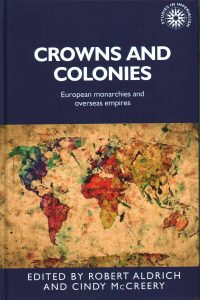 Starting from the assumption of the diarchic relation between the King, Vittorio Emanuele III, and the Duce, Benito Mussolini, in Italy, the chapter analyses if this relation influenced the administration of Italian colonies. The establishment of the Empire of Italian East Africa in 1936, after the conquest of Ethiopia, is assumed like a turning point in Fascist colonial policy; the new imperial role of the King Vittorio Emanuele III was effectively reshaped by the fascist character the regime gave to the Empire. The proclamation of Amedeo d’Aosta, a member of the royal family, as Viceroy of the Empire and Governor General of the Empire of Italian East Africa, indicated the colonial space like one of the places where the diarchic relation between Italian Monarchy and the Fascist regime emerged.
Starting from the assumption of the diarchic relation between the King, Vittorio Emanuele III, and the Duce, Benito Mussolini, in Italy, the chapter analyses if this relation influenced the administration of Italian colonies. The establishment of the Empire of Italian East Africa in 1936, after the conquest of Ethiopia, is assumed like a turning point in Fascist colonial policy; the new imperial role of the King Vittorio Emanuele III was effectively reshaped by the fascist character the regime gave to the Empire. The proclamation of Amedeo d’Aosta, a member of the royal family, as Viceroy of the Empire and Governor General of the Empire of Italian East Africa, indicated the colonial space like one of the places where the diarchic relation between Italian Monarchy and the Fascist regime emerged.
———————————————————————————————–
Ambrogio Caiani, ‘Collaborators, Collaboration, and the Problems of Empire in Napoleonic Italy, The Oppizzoni Affair, 1805-1807’, The Historical Journal, First View Article / July 2016 pp. 1-23.
The recent bicentennial commemorations of the Napoleonic empire have witnessed a 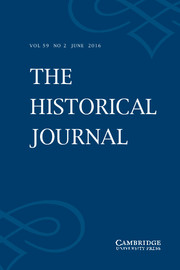 proliferation of new studies. Scholars now possess much more sophisticated conceptual tools than in past decades with which to gauge the problems faced by French imperial administrators throughout Europe. Well-trodden concepts, like centre/periphery or collaboration/resistance, have been reinvigorated by more sophisticated understandings of how rulers and ruled interacted in the early nineteenth century. This article argues that, while much progress has been made in understanding problems of ‘resistance’, there is more to be said about the other side of the same coin, namely: ‘collaboration’. Using the micro/local history of a scandal in Napoleonic Bologna, this article wishes to reaffirm that collaboration was an active agent that shaped, and often shook, the French imperial project. The biggest problem remained that, despite ‘good intentions’, collaborators sometimes simply did not collaborate with each other. After all, imperial clients were determined to benefit from the experience of empire. The centre was often submerged by local petty squabbles. This article will use a specific micro-history in Bologna to highlight the extent to which Napoleonic empire builders had to thread a fine line between the impracticalities of direct control and the dangers of ‘going native’.
proliferation of new studies. Scholars now possess much more sophisticated conceptual tools than in past decades with which to gauge the problems faced by French imperial administrators throughout Europe. Well-trodden concepts, like centre/periphery or collaboration/resistance, have been reinvigorated by more sophisticated understandings of how rulers and ruled interacted in the early nineteenth century. This article argues that, while much progress has been made in understanding problems of ‘resistance’, there is more to be said about the other side of the same coin, namely: ‘collaboration’. Using the micro/local history of a scandal in Napoleonic Bologna, this article wishes to reaffirm that collaboration was an active agent that shaped, and often shook, the French imperial project. The biggest problem remained that, despite ‘good intentions’, collaborators sometimes simply did not collaborate with each other. After all, imperial clients were determined to benefit from the experience of empire. The centre was often submerged by local petty squabbles. This article will use a specific micro-history in Bologna to highlight the extent to which Napoleonic empire builders had to thread a fine line between the impracticalities of direct control and the dangers of ‘going native’.
______________________________________________________________________________________________
Giacomo Macola, The Gun in Central Africa: A History of Technology and Politics (Athens: Ohio University Press, (2016)
This monograph offers a thorough reassessment of the history of firearms in central Africa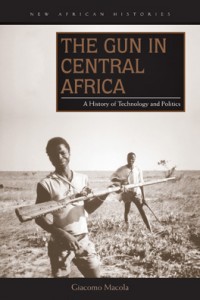 between the nineteenth and the twentieth century. Approaching the subject from a culturally sensitive perspective that encompasses both the practical and the symbolic attributes of firearms, The Gun in Central Africa presents Africans as agents of technological re-innovation who understood guns in terms of their changing social structures and political interests. By placing firearms at the heart of the analysis, this volume casts new light on processes of state formation and military revolution in the era of the long-distance trade, the workings of central African gender identities and honour cultures, and the politics of the colonial encounter.
between the nineteenth and the twentieth century. Approaching the subject from a culturally sensitive perspective that encompasses both the practical and the symbolic attributes of firearms, The Gun in Central Africa presents Africans as agents of technological re-innovation who understood guns in terms of their changing social structures and political interests. By placing firearms at the heart of the analysis, this volume casts new light on processes of state formation and military revolution in the era of the long-distance trade, the workings of central African gender identities and honour cultures, and the politics of the colonial encounter.
_______________________________________________________________
Andrew Cohen, ‘Lonrho and the Limits of Corporate Power in Africa, c.1963-73’, South African Historical Journal, 68:1 (2016), pp. 31-49.
This article focuses on the British multinational business Lonrho and the very real limits to its 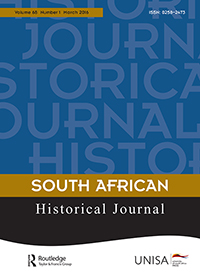 corporate power. In doing so it will examine the expansion of Lonrho, under its buccaneering chairman Roland ‘Tiny’ Rowland, from its Southern Rhodesian roots across the African continent. In addition, it will demonstrate how Lonrho’s African businesses proved crucial in buttressing Rowland’s control of the company in an attempted boardroom coup during May 1973. While Rowland’s ability to coerce African governments was negligible at best, his African relationships and networks provided a key component of his successful battle to retain control of the company. As such this article demonstrates the need to (re)-consider the multifaceted nature of corporate power during the period of decolonisation.
corporate power. In doing so it will examine the expansion of Lonrho, under its buccaneering chairman Roland ‘Tiny’ Rowland, from its Southern Rhodesian roots across the African continent. In addition, it will demonstrate how Lonrho’s African businesses proved crucial in buttressing Rowland’s control of the company in an attempted boardroom coup during May 1973. While Rowland’s ability to coerce African governments was negligible at best, his African relationships and networks provided a key component of his successful battle to retain control of the company. As such this article demonstrates the need to (re)-consider the multifaceted nature of corporate power during the period of decolonisation.
Christine Whyte, ‘Between Empire and Colony: American Imperialism and Pan-African colonialism in Liberia, 1810-2003’, National Identities (2015), pp.1-16.
Both Liberia and the USA make their independence from the imperial/colonial systems of the nineteenth and twentieth centuries an integral part of their national identities. Despite an upsurge in the use of the term ‘American Empire’ since the invasion of Afghanistan and Iraq, the American government has firmly identified itself as a republic with no colonial ambitions. Liberia, dubbed ‘Africa’s oldest republic’, has similarly fashioned a national self-image of freedom and independence. This article uses the concept of Colonialism without Colonies to critically evaluate these claims, and further open up questions about the nature of imperialism in contrast to colonialism.
nineteenth and twentieth centuries an integral part of their national identities. Despite an upsurge in the use of the term ‘American Empire’ since the invasion of Afghanistan and Iraq, the American government has firmly identified itself as a republic with no colonial ambitions. Liberia, dubbed ‘Africa’s oldest republic’, has similarly fashioned a national self-image of freedom and independence. This article uses the concept of Colonialism without Colonies to critically evaluate these claims, and further open up questions about the nature of imperialism in contrast to colonialism.
____________________
Christine Whyte, ‘”Freedom but Nothing Else”: The Legacies of Slavery and Abolition in Post-Slavery Sierra Leone, 1928-1956’ International Journal of African Historical Studies, 48:2 (2015), pp. 231-250.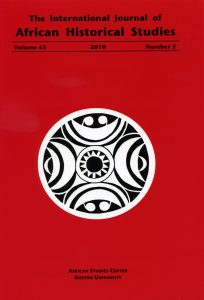
This article traces two particular resonances of post-slavery history in Sierra Leone, from the abolition of slavery in 1928 to the riots around decolonization in 1955–56. The first was the state-led efforts to engineer a transition to freedom for ex-slaves that would keep them engaged as willing workers. The second was the ways in which Sierra Leonean elites sought to control the labor of the ex-slave classes by relegating them to the position of a marginalized “youth.”
Christine Whyte, “‘Everyone Knows that Laws Bring the Greatest Benefits to Mankind’: The Global and Local Origins of Anti-Slavery in Abyssinia, 1880–1942” Slavery & Abolition (2014)
This article places the legal abolition of slavery in 1930s Abyssinia into the context of a broader  reforming and modernising movement within the Abyssinian imperial government. This modernising movement drew inspiration from ancient Abyssinian legal codes and the transformation of Japanese society, as well as the international anti-slavery movement.
reforming and modernising movement within the Abyssinian imperial government. This modernising movement drew inspiration from ancient Abyssinian legal codes and the transformation of Japanese society, as well as the international anti-slavery movement.
Andrew Cohen, ‘Britain and the Breakdown of the Colonial Environment, the struggle over the Tanzam Oil Pipeline in Zambia’ Business History Review, 88:4 (2014), pp. 737-759.
This article explores the tendering process for the construction of the Tanzam oil pipeline during the mid-1960s. It addresses aspects of the political response to British investment overseas and the history of the British company Lonrho, and argues that the British Government’s determination to concentrate its financial investments at home affected its ability to project its presence through supporting business overseas. In addition it suggests that the Zambian Government demonstrated
